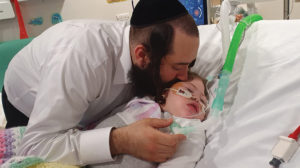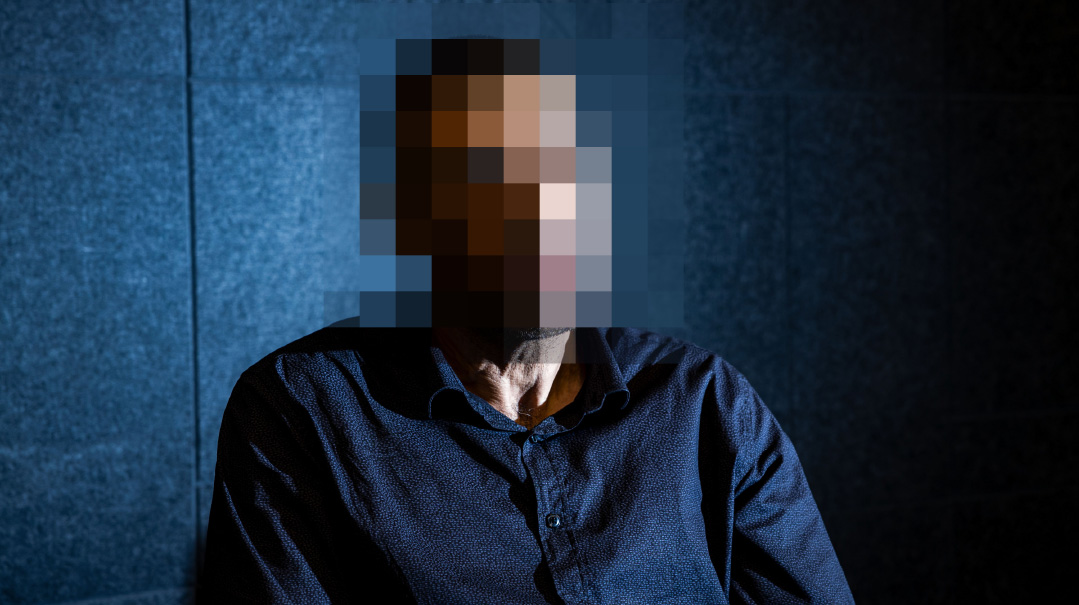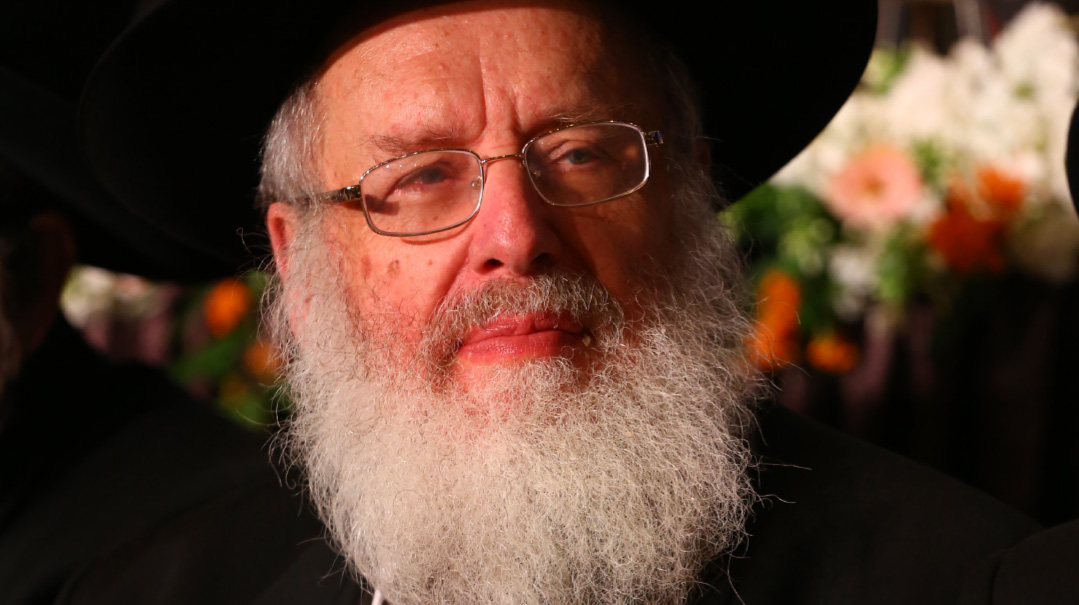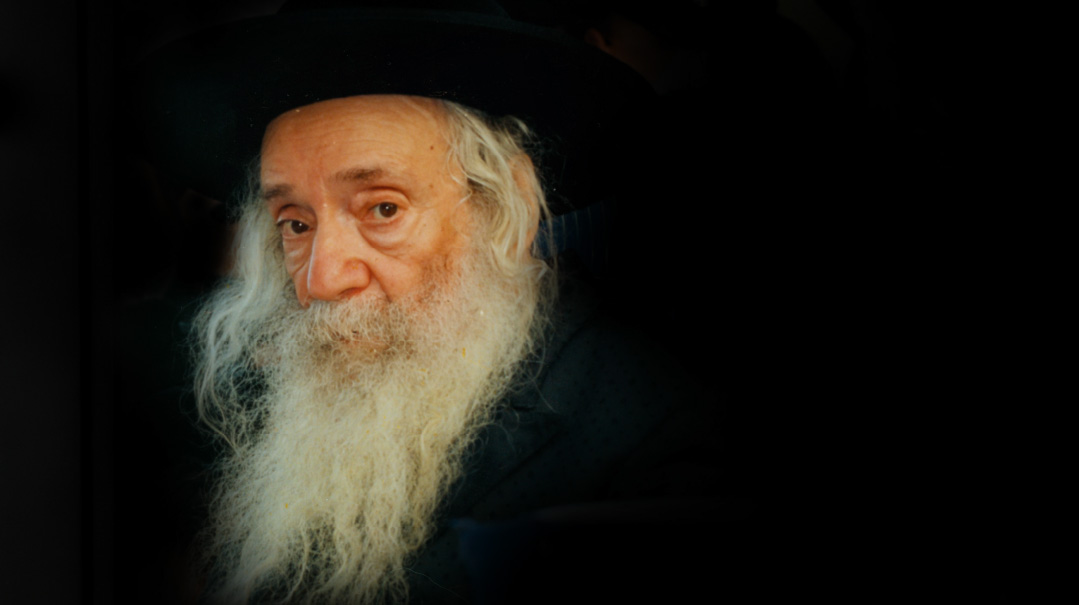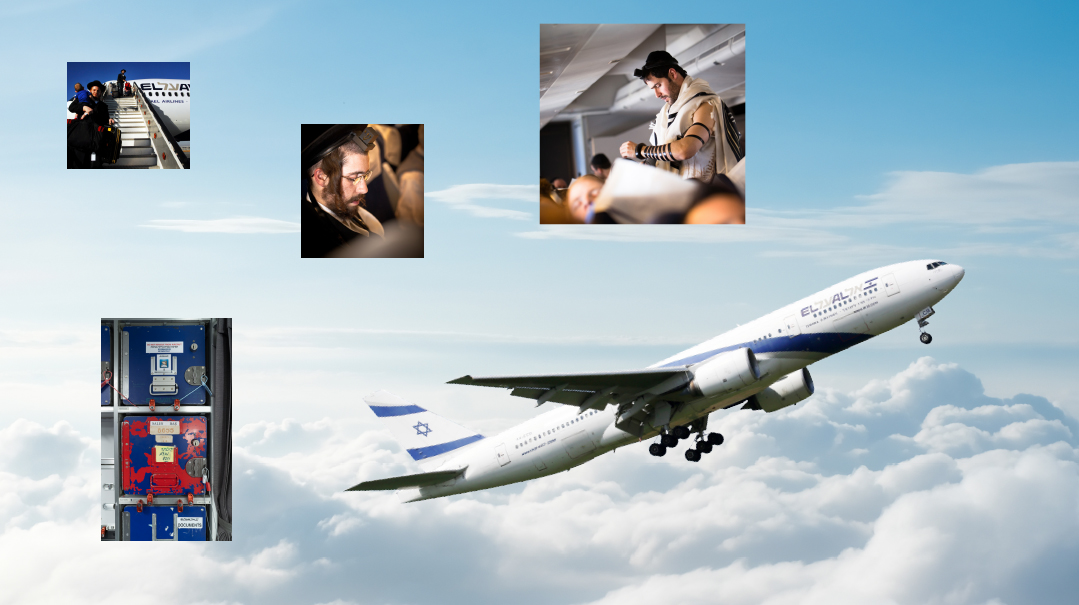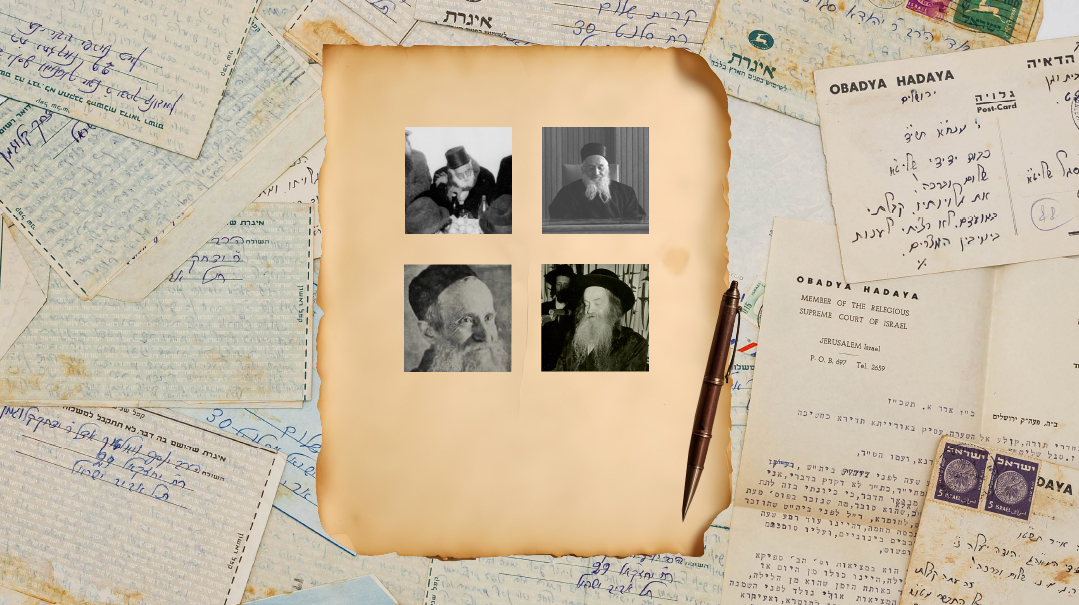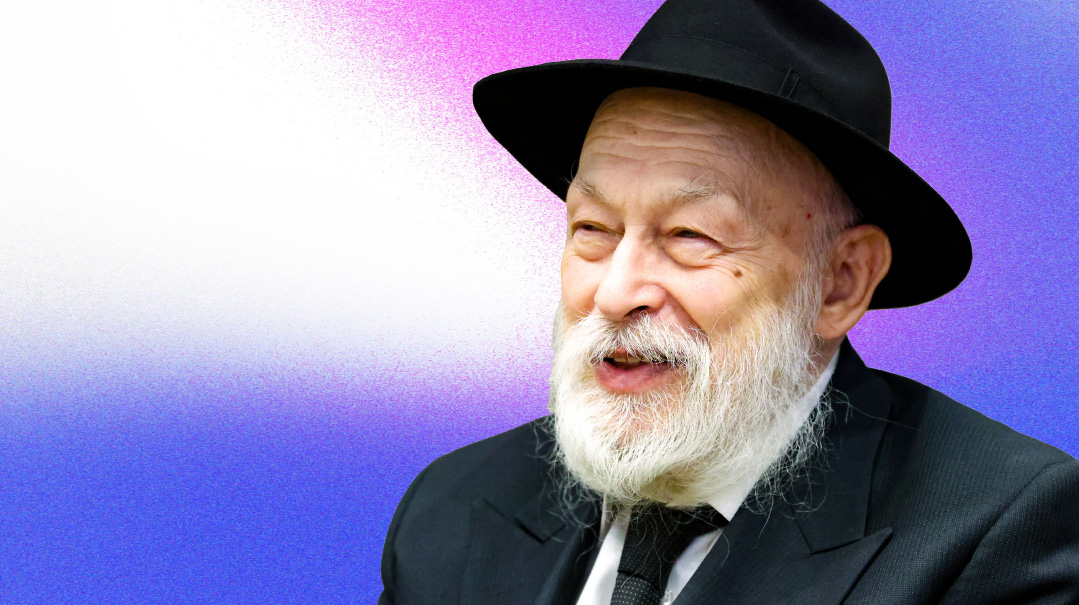The People Come First

From behind his new pulpit at the OU, Rabbi Moshe Hauer connects to the whole crowd
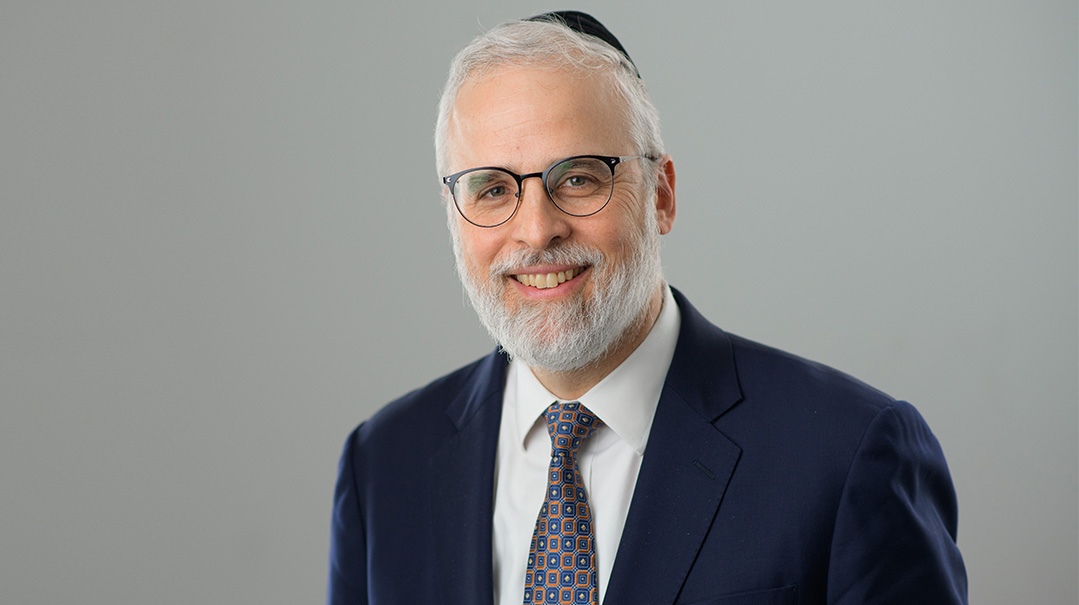
Photos: Naftoli Goldgrab
Before every Yom Tov, a group of talmidim in my hometown of Montreal join to hear a chaburah from Rav Moshe Mendel Glustein, rosh yeshivah of Yeshiva Gedolah of Montreal.
Covid brought change to our chaburah as it did to everything else, and now it’s become a Zoom chaburah — disjointed faces on a screen, others calling in — as the Rosh Yeshivah tries to summon up the spirit of the beis medrash through the lens of a camera.
But the digital format does have an advantage. It’s brought us some new faces, talmidim who don’t live in Montreal but now have the chance to hear the rebbi speak in real-time and wouldn’t miss it.
Shortly before this past Pesach, the Rosh Yeshivah mused to me about having seen the face of Rabbi Moshe Hauer on the bottom right of the screen during his most recent chaburah. “I don’t know,” Rav Glustein remarked, “how he can find half an hour a few days before Pesach, when he’s paskening and helping families and guiding people, to sit and listen. It makes no sense.”
Then the Rosh Yeshivah paused and said, “But it does make sense, because it’s him. That was always him.”
The Rosh Yeshivah is saying good.
Some rabbanim move from call to call, meeting to meeting, without a chance to catch their breath. You see their devotion and the energy, but also the commotion, that frantic look.
But Rabbi Moshe Hauer, executive vice president of the Orthodox Union, doesn’t give a clue.
His demeanor, his measured way of speaking, and — to share what my kids call TMI — the way he eats his soup during our lunch, the unhurried precise motions, call to mind the baalei mussar of the last generation.
Even as he is dealing with the issues of this generation, in real time.
Dealing as rabbi. Dealing as diplomat. Dealing as policy-maker. Dealing as organizational leader.
Because here he is, filling a job he didn’t think he’d get.
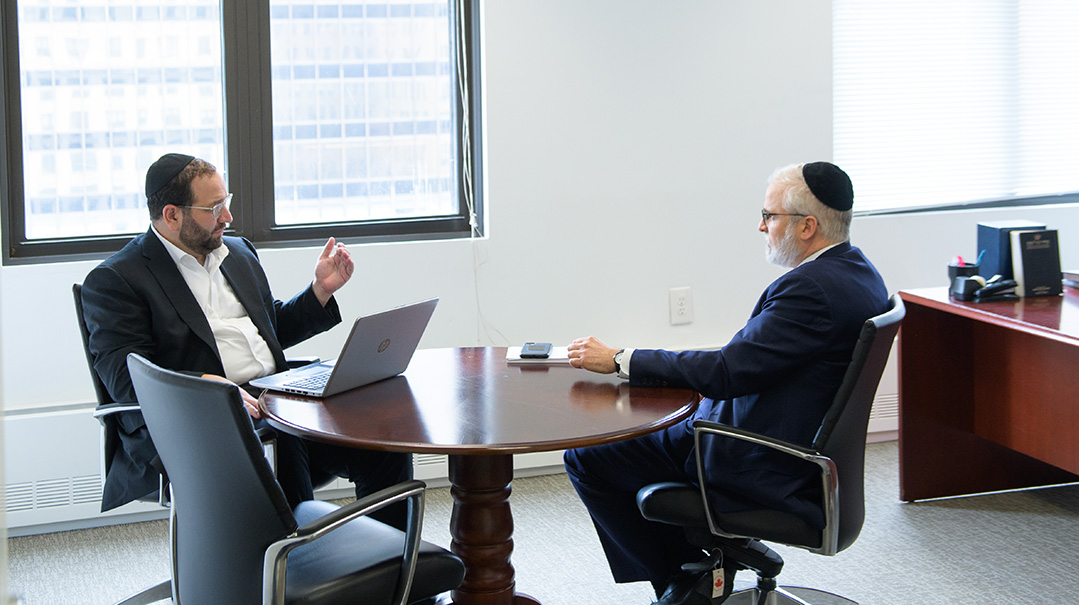
It was one of the more exhaustive search processes in recent Jewish communal life. The Orthodox Union — one of the largest Orthodox organizations in the United States with more than a century of activism in its rich record — was at a crossroads. Its executive vice president, Allen Fagin, was poised to retire, and its president, Moishe Bane, sought the right leader to direct a superpower organization adapting to a shifting world, growing in government influence, and more importantly, maximizing its efforts to engage and encourage Torah learning.
An alumnus of Ner Israel in Baltimore, the attorney found himself discussing the challenges with his close friend and co-native Montrealer, Rabbi Moshe Hauer, who, like him, had been a close talmid of Ner Israel’s rosh yeshivah Rav Yaakov Weinberg.
It wasn’t just a single conversation or even two. It was sort of a recurring discussion, and Rabbi Hauer, who was knee-deep in the responsibilities of practical rabbanus in a very busy Baltimore shul, admired what the OU executive was trying to do.
Rabbi Bane knew what sort of leader the OU needed — the requisite ideological, intellectual, and emotional skill set — and one day, he decided to take a shot at what he assumed was an impossibility: He offered the position to his informal consultant.
It was a non-starter, because the job called for someone on-site at the OU’s Manhattan headquarters, and Rabbi and Rebbetzin Hauer weren’t prepared to leave Baltimore, where they had deep roots and consuming commitments as rav and rebbetzin of a thriving shul.
“I laughed, thanked him, and explained why it wasn’t for us,” Rabbi Hauer recalls, and adds a candid postscript, “I was sort of sad. It was a job I thought I might have liked to tackle.”
He turned back to regular life, a nagging sense of doubt relegated to the far corners of his mind, when Moishe Bane suddenly appeared at the Hauer home in Baltimore. “Working out of the OU’s New York headquarters was surely the job requirement,” says Reb Moishe, “but the OU’s Executive Committee unanimously agreed that having Rabbi Hauer in New York two or three days a week was more worthwhile than hiring any of the other candidates.”
They wanted him. He didn’t have to move. It was fine, welcome aboard.
Across all the levels of the OU world — its leadership, its constituency, and the wider Orthodox public — the news of Rabbi Hauer’s appointment to the position of executive vice-president was greeted with excitement. It seemed the perfect fit: the man blessed with the learning, experience, and vision to lead the organization forward at a confusing time, though no one could realize late in the winter of 2020 just how confusing it was about to get.
An experienced askan once told me, “No one can solve battles within the community if they haven’t solved the battles within themselves.”
This might be Rabbi Hauer’s legacy within his own kehillah, in Baltimore. Certainly the learning and leadership but also the tranquility and ne’imus and pleasant, calm demeanor.
It starts with loving what you do, and it’s something he learned early on.
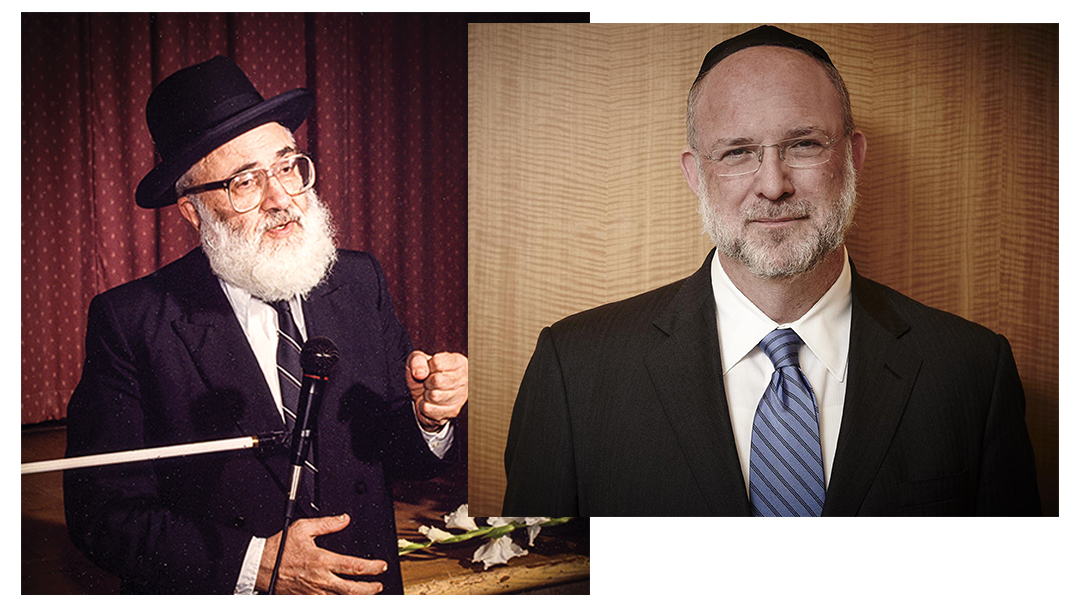
Rabbi Benjamin Hauer took an unusual route for a Romanian war survivor, arriving in Canada alone and throwing himself into… learning Torah. Rav Avrohom Aharon Price, a rosh yeshivah and mechaber sefarim in Toronto, learned with a group of talmidim around his table, sending forth the first-generation of locally-produced rabbis in Canada.
“For the first time since its inception fifty-five years ago, Beth Jacob has an English-speaking rabbi,” the local Jewish newspaper reported when young Rabbi Hauer got his first pulpit at Toronto’s Beth Jacob.
But how was the new arrival able to speak English just two years after arriving from Eastern Europe, while also having used that time to study for semichah and complete a degree at the University of Toronto?
“My father was a communicator,” Rabbi Hauer explains, “and he enjoyed language, the way words could affect people. Later in his career, when he was in Montreal, he officiated at a chuppah for a French-speaking couple, and he challenged himself to read the kesubah to them in a Moroccan French — he wanted to be understood. He perceived that being heard is the gauge of successful rabbanus.”
He married Rebbetzin Miriam, and together, they traveled to Montreal to assume leadership of a prestigious pulpit at the B’nei Jacob shul. She would serve not only as the consummate rebbetzin, but also take her place as a beloved teacher.
“Early on,” recalls their only son, “there was this culture of love for chinuch in my home, a love of teaching. My father’s job wasn’t always easy, especially as he became more prominent — the politics were inevitable — but he never lost his passion.”
Young Moshe was sent to the Yeshiva Gedolah of Montreal, where he completed both elementary and high school. “It was there that I formed a close relationship with Rav Glustein, who was able to guide me. On one hand, it was a more yeshivishe institution, but my father’s shul, and the neighborhood in which I lived, was a bit different than that, and he got that, he worked with us.”
From Montreal, he went to learn in Baltimore’s Ner Israel.
A rush of emotion colors his face. “The first time I walked in to the beis medrash, I had this overwhelming sense of being home. The roar of Torah captivated me.”
He would remain between the walls of the great yeshivah for over a decade, becoming a devoted talmid of Rav Yaakov Weinberg. Then he married a local girl, the daughter of Rabbi and Mrs. Joseph Baumgarten.
Rabbi Dr. Baumgarten was the rav of a small shul and a noted professor at Johns Hopkins, celebrated for his work on the Dead Sea Scrolls. Rabbi Hauer’s own parents, who’d dedicated themselves to a congregation and knew well the challenges of rabbanus, didn’t want him to become a formal rav, but Baltimore old-timers tell me, “It was obvious to anyone watching that Rabbi Hauer was one of those people with the rare blend of real intellect and real passion. He was teaching Torah, but he was also conveying the heart of the Torah, the achrayus of Torah, the generosity of Torah.”
Baltimore’s Bnai Jacob, which carried the same name as the shul in which Rabbi Hauer had grown up, was a small shul with a waning membership, and Rabbi Baumgarten was only too happy to allow his son-in-law to deliver shiurim.
Those shiurim would one day resonate across large swathes of American Orthodoxy.
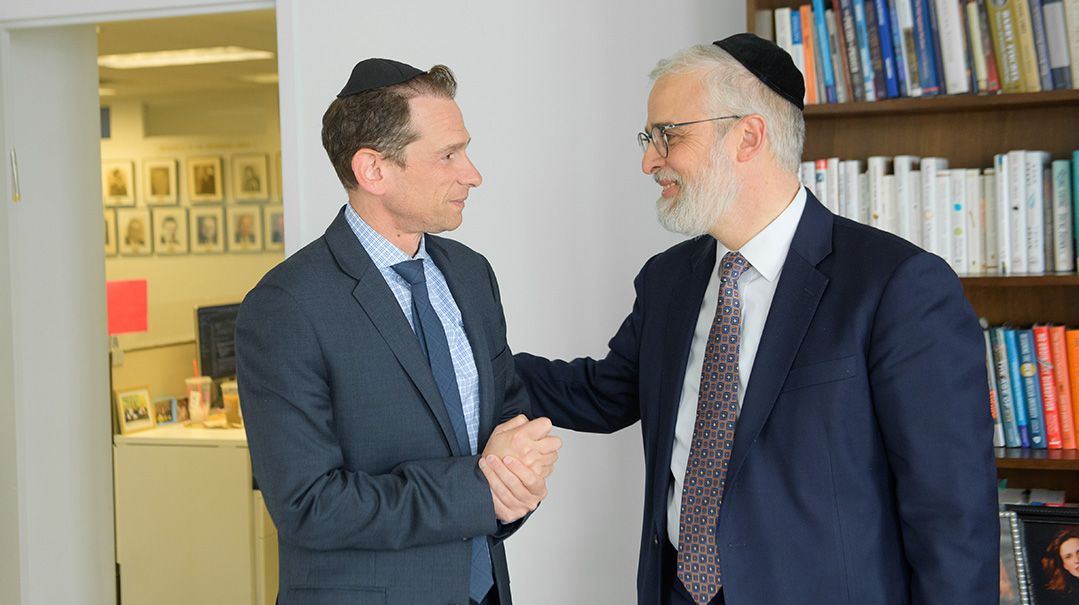
The shiurim and chaburos started to draw the younger generation to Bnai Jacob, and in 1994, Rabbi Hauer was appointed as rav. In 1999, the congregation merged with another local shul, Shaarei Zion, and renamed Bnai Jacob Shaarei Zion, it moved into its beautiful, spacious new home, finally capable of accommodating the large crowd it was drawing every Shabbos.
Rabbi Hauer, the diligent kollel avreich-turned-rabbi, remembers that time. “I had fallen in love with the Torah while in Ner Israel, and I just wanted to share it. Somehow, in teaching it to others, I fell in love with Jews.”
At a special celebratory dinner for Rabbi Moshe and Rebbetzin Mindi Hauer in 2019 (a year before he accepted the OU job), marking 25 years at the helm of BJSZ, the assistant rabbi (and eventual successor to Rabbi Hauer as rabbi at BJSZ), Rabbi Daniel Rose, shared a memory.
The two rabbanim were visiting some of the homebound and ill community members. As they walked out of the apartment of a particular lonely woman, the younger rabbi noticed that Rabbi Hauer’s face was glowing. “That,” Rabbi Hauer enthused, “is where the real money is.”
On Fridays, always a busy day for a rav, Rabbi Hauer found time for something else equally central to his mission: He would mentor younger rabbanim, a chaburah of about 15 aspiring rabbanim gathering in his study to review the questions and situations that had arisen over the week.
And with time the group grew. “He mentors rabbanim not just from Baltimore, but from across the country,” says Rabbi Efrem Goldberg of the Boca Raton Synagogue. “He has shown us how to remain authentic, to be thoughtful in all decisions, to be able to really see an issue from all sides and how it will affect people.”
Sitting with families in distress, trying to help individuals with chinuch, shalom bayis or parnassah issues, Rabbi Hauer realized something. “There are problems that run deeper than the person in front of you, things that have to do with the framework of the community. It was frustrating to deal with symptoms of a problem and not be able to fix the root. Because if you can fix the framework itself, you can solve that issue not just for the person sitting in your office, but for everyone facing that challenge.
“I think,” he is speaking even slower than usual, measuring each word, “I think that when the opportunity at the OU came up, that’s what attracted me most: the chance to make a difference at that level.”
At the celebratory dinner in 2019, his mother — who now lives in Jerusalem and came in specially to celebrate with her children — maintained that his schedule was too exhaustive.
But it was about to get a lot tougher.
When Rabbi Hauer took on his new position, he joined the helm of a colossal organization. The Orthodox Union has several thousand employees and associated contractors globally, with 22 departments and offices in Jerusalem, New York, New Jersey, Washington, D.C., and California. In addition to its role as the world’s largest kashrus certifier, the OU runs educational programs for all age groups, support for smaller Orthodox communities across the United States, outreach programs, and support for people with disabilities. Its priorities include maintaining a high profile in government advocacy, but the organization also addresses communal issues within the Orthodox community and sets policy for hundreds of shuls under its umbrella.
That Rabbi Hauer is able to stay laser-focused on the human aspect and rise above the bureaucratic current that has pulled down so many others, is — according to him — because of his “shutaf.” (His word.)
“The chance to provide a warm, sustaining spiritual presence and direction in the lives of others is real, but it’s the second step,” he says. “The organization has to run, first and foremost, and since I’m not an MBA and don’t have executive experience, I didn’t see that I could do this alone.”
Rabbi Dr. Josh Joseph had been a hedge fund manager and executive at Yeshiva University when the call came from the OU. Once he agreed to join Rabbi Hauer as executive vice president and COO, the puzzle was complete.
“We made up to meet face-to-face in Washington at the AIPAC conference in March of 2020,” Rabbi Dr. Joseph recalled, “but our predecessor as the OU executive vice president, Allen Fagin, suggested that perhaps we should delay the meeting since there was this strange virus that was sweeping through the country. Perhaps it would be prudent to stay at home.”
So they postponed that meeting. Then suddenly, Rabbi Hauer, the incoming new chief, was asked whether the NCSY Shabbaton planned around the AIPAC conference should be cancelled or not. Rabbi Hauer has been riding the Covid roller coaster pretty much ever since, even though his suit remains neatly pressed and his shirt is still without wrinkle.
Full disclosure: The next part of our conversation was more contentious than it will sound on paper. It was pleasant and respectful, but I genuinely didn’t understand the OU approach to dealing with the pandemic, and Rabbi Hauer did a remarkable job of not just answering my questions but also in doing so with the demeanor and tone of someone talking about the weather. It never got personal.
(A very well-known rabbi, prominent in his writings and speeches, recently took public issue with another rabbi. The first rabbi attacked the second in a speech, and the second rabbi defended himself in print, making his disdain for the first one clear. Before Tisha B’Av, Rabbi Hauer called the second rabbi — the victim of the original attack — and suggested a peaceful conversation between the two rabbis, with him, Rabbi Hauer, moderating. The two men spoke, trying to understand one another, as Rabbi Hauer guided both of them. They never did grow to fully understand one another, but a channel of peace opened between them, and they did agree to put the past behind them and respect each other’s sincere efforts to bring kevod Shamayim, albeit in different ways. This was not an OU program, and there was no sponsor or login info, but it’s a big part of what Rabbi Hauer does. Every day.)
In the sugya of the frum community and Covid, there are 600,000 opinions.
“To us at the OU,” Rabbi Hauer reflects, “it was important that our position be one with real integrity, not an on-the-fly, decide-on-the-spot way of dealing with it. Eventually, the pandemic will end, with Hashem’s help, but who can put the genie back in the bottle in terms of honesty, respect for government, reverence for human life?
“Darchei shalom means not only to get along with our hosts in galus in a diplomatic way, but to be compassionate, generous people in the way we relate to others. Eivah, generating hatred, is a real sugya, and it’s certainly as relevant today as it ever was. Honesty, Middas Ha’emes, is important. When we saw chasunahs openly flouting the regulations, or videos of people burning masks, I felt sad, maybe worried. That was not where we wanted to be.”
He continues, making another important disclaimer.
“Now, there were those who wanted us to issue statements against that sort of thing, to dissociate ourselves from it, but it’s not our place to lecture others. At the same time, we doubled down on the hashkafic principles that guide us and reminded our constituents of where we stand.”
There is resolve in his voice. “Training ourselves to ignore the government isn’t good. Cheapening, even by a bit, the value of human life, isn’t good. So at the direction of the OU poskim, we followed the CDC guidelines throughout and will continue to do so. Wearing a mask in shul isn’t comfortable? That’s only because you didn’t work hard enough to invest people with a sense of kedushah, of dignity and truth, in being careful. If we do our jobs, our mispalelim will see it as part of the avodah.
“Very often during the last year and a half, great roshei yeshivah that people associate more with the right-wing world than the Modern Orthodox community called to express appreciation for our approach, they felt that it was a kiddush Hashem that we were speaking that way.”
The expansion of the OU’s constituency, with their growing advocacy efforts and increased Torah initiatives, including AllDaf and Semichas Chaver, is evident, and once he mentions it, I jump in.
What is the difference between the demographics served by the Orthodox Union and, for example, the Agudah? Isn’t there overlap in the constituent base, and if so, is there a need for two organizations working in similar arenas?
“I wear a black hat,” he remarks, “but that doesn’t make the OU a black-hat organization. Our organizations serve people Agudah cannot reach, and I have no doubt that Agudah is reaching people that we can’t get to.”
In the past, a personal pet project of Rabbi Hauer’s was Klal Perspectives, an online journal where hashkafic ideas were discussed by talmidei chachamim and leading askanim. In his new office, where he holds not just authority but also the keys to resources and personnel that can implement a vision, he is able to transition from scholarly analysis and social commentary to actual problem-solving.
“My personal focus here is the family, the family unit. The challenges are serious and many, and one by one, we’re trying to address them. Tuition relief is obviously crucial, because it would ease the burden on our families, and we’re making real headway there. We’re not there yet, but you can already see practical differences in the funding flowing toward our schools.”
But it’s not just tuition that’s eating at today’s average frum family, Rabbi Hauer feels. It’s the affordability of our lifestyle in general. “Parnassah struggles are real, and every small solution is a means of lessening stress. We are invested in supporting the growth of out-of-town communities, where housing is much more affordable, and, to be honest, the family unit often thrives in a way not always accessible in-town.”
He tells me about a young man who moved to Baltimore from a much smaller community. His family settled in nicely, but, he confided to Rabbi Hauer, “My family has gone from providers of Yiddishkeit to consumers of Yiddishkeit.”
The young man’s words resonated. “I think,” the rabbi remarks, “that we need to find a way to make sure every person, every home, is also a provider. That will keep the family and its Yiddishkeit fresh and alive.”
One of the effects of the OU Covid policies was the virtual shutdown of shuls. Even those that remained in operation opened only for minyanim, with limited attendance. With the reopening of institutions and shuls officially permitted to regroup, the OU offered financial grants to help restart the spiritual economy.
“You can make fun,” Rabbi Hauer says (I promise I said nothing and didn’t make fun at all, but maybe the wise rabbi sees something in my expression?), “but the joy is coming back. We’re heavily invested in making the shul the community hub again, a place that’s friendly to singles, to ba’alei teshuvah, to teenagers. We’re all in on this, and it’s working, baruch Hashem. Admitting a problem doesn’t make you weak,” he adds, “but maybe the opposite. Of course our shuls dried up a bit over Covid, when they were essentially closed, but we’re ready to do it better now.”
A side benefit to offering grants and reviewing ideas is the discovery that people genuinely care. “A generation ago, we saw lots of passion for Klal Yisrael, people determined to rebuild what was lost, but a young person who grows up today, seeing that every conceivable need is already met — where should they get passion from? What’s missing? This was one of the silver linings of Covid — it forced us to innovate and find new sources of inspiration and excitement.”
That excitement is necessary to build.
Maury Litwack of TEACH NYS, an OU affiliate, was at headquarters one day when Rabbi Hauer had “like 25 meetings, one after another.” At one point, Rabbi Hauer poked his head into Maury’s office for what Maury thought was a question related to one of the ongoing meetings.
“But he had come in just to smile, say hello and ask how I was doing,” Maury remembers. “Joy in what you do isn’t a luxury, but imperative, and that’s a big part of what he conveys, just by being him.”
It’s not a bubbly, back-slapping, joke-cracking type of joy, but something much more basic.
“When my rebbi, Rav Weinberg, was niftar, I was lost,” Rabbi Hauer says. “During the shloshim, I went over to another of my rebbeim, Rav Zvi Berkowitz, and told him that just as I had learned b’chavrusah with the Rosh Yeshivah every week for 17 years, I was asking him to learn with me now. He agreed and we’ve been learning weekly for 21 years. That gives a lot of joy.”
I randomly ask what time each week and Rabbi Hauer answers immediately, his voice going up a notch. “Tuesdays at three!”
He smiles unabashedly and repeats it. “Tuesdays at three.”
And that’s not all. “I still say shiurim to my old shul, which is nice, it’s rejuvenating. And baruch Hashem, the OU lets me go home, basing myself in Baltimore and spending only one night a week in New York, giving me two days each week on site. It’s not a dream job? Why shouldn’t I be happy?”
When Rabbi Hauer was a small child, sitting in his seat at B’nei Jacob on Clanaranald Street in Montreal, he was positioned between two older gentlemen. One had trouble seeing, so the rabbi’s son would help find the place on the page and point to the words, and the other had trouble hearing, so the boy would make sure to enunciate each word of tefillah out loud for his seatmate.
Early on, he learned that shul is a place of avodah, of spiritual growth, of community and of shared service.
But it’s also a place with real people, with real issues. And if you talk clearly and point to the right place, you can help them.
(Originally featured in Mishpacha, Issue 873)
Oops! We could not locate your form.






